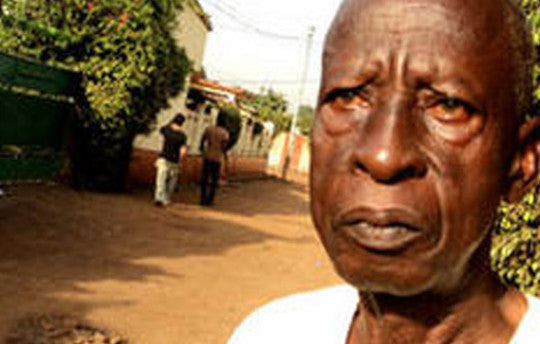Your Cart is Empty

Balla Onivogui, bandleader of the influential Guinean band, Balla et ses Balladins, died of a heart attack on March 15th 2011. His music played a key role in shaping a truly golden era of Guinean music. Balla was born in Macenta, South-east Guinea. He was a gifted trumpet player and on this merit gained a seat in the state-sponspored, Syli Orchestre National. He swiftly became leader of one of the sections of the orchestra. Gradually this ensemble emerged as a band in its own right and would eventually break away to become, Balla et ses Balladins. In accordance with the policy of Guinea’s post-independence leader Sékou Touré, the band recorded and performed under the national record label, Syli.
Guinea was the first Francophone West African country to gain independence in October 1957. Sékou Touré and the Parti Démocratique de Guinée (PDG) were elected to government. The PDG swiftly implemented a set of far-ranging political reforms that echoed Touré’s Marxist leanings. In 1968 Touré initiated a socialist cultural revolution and launched an initiative called, ‘Authenticité’. The policy actively instructed musicians to re-invent traditional Guinean music. The government set up state-sponsored ensembles, distributed musical instruments and provided musical tuition. Balla et ses Balladins were heavily patronized by the state and enjoyed huge success in Guinea.
Balla had a turbulent relationship with Touré’s despotic rule. ‘Authenticité’ aligned tracks such as P.D.G (1968) were composed in direct support of the government. Yet, at times Balla expressed frustration at the government’s intimate control of song topics and creative choices. He was even replaced for a small period by trombonist Pivi Moriba, but was returned to his post via the instruction of Sékou Touré himself.
The music is wonderfully and unmistakeably Guinean whilst still retaining traces of Cuban and Congolese influence. Balla and his band modernized Guinean music by translating elements of traditional Guinean music on to electric guitars and horns. On the track Sara(1968), two electric guitars and a bass guitar play repeat interlocking rhythmic motifs that are highly characteristic of bala playing style. The bala is a traditional Guinean xylophone that is played by the jeli (griots).
Along with other epochal bands such as Bembeya Jazz and Kelitigui Et Ses Tambourinis, Balla et ses Balladins forged a fresh sound for a new and independent Guinea. Despite the circumstances of creation, under Sékou Touré’s harsh and tyrannical rule, the music is some of the most beautiful West African music ever produced.
Balla et ses Balladin’s discography documents the evolution of true and modern Guinean sound. It is a sound that could not have been established without Balla Onivogui.